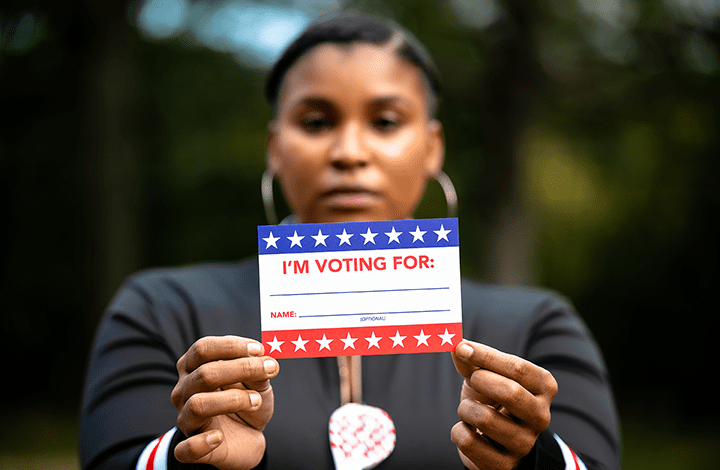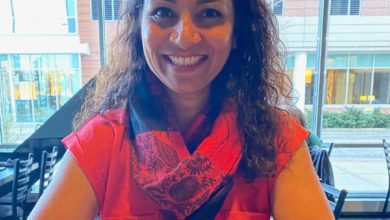Commentary: Why we are still talking about voting rights in 2022

Like many white children in the 1980’s and 1990’s, I knew Rev. Dr. Martin Luther King Jr. for calling on this nation to move towards a society where his children would “one day live in a nation where they will not be judged by the color of their skin but by the content of their character.”
It was just one line delivered in the famous 1963 “I Have a Dream” speech as King stood before 250,000 Americans at the Lincoln Memorial during the March on Washington. The most digestible line for many white Americans tugged on their heartstrings as they have, over decades, agreed that a child’s skin color should not be the only factor in our collective judgment of their person.
King, though, said more than 25 words on that day. 792 more, actually.
Those words painted a picture of inequality in living conditions, police brutality, segregation, and the right to vote among white people and people of color. Of course, that was not the first time Dr. King spoke and it was not his last.
Still, almost six decades later, we continue to cherry-pick King’s words to advance our own views of what the world is or should be. I’ve been guilty of it. But I will no longer sit in the seat of endangering the rights of other human beings because of my “sincere ignorance and conscientious stupidity.”
We have this ideal of equality for all, granted by the founders of this nation, whether intentioned or practiced. We lack, though, the systemic forethought to establish and protect policies and laws that will, by some measure, ensure actual equality, even voice for all of our nation’s people.
The idea that as we get to know another humans’ heart and thoughts, we will advance the societal rights of that person is noble. Yet, here we are, almost 60 years after the Right to Vote Act was passed, struggling to maintain the simple principles of democracy.
King’s words and call to action have to be reclaimed by his descendants, as they remind the American community what he, Civil Rights activists, and basically all of the BlPOC community have understood from the time the Declaration of Independence was signed: that this nation can live up to its ideals if it is based on those ideals.
That “if” is key.
The threads that were developed within the formation of our country: those of growth of wealth at the expense of another human being, those that provide or take away rights to ensure power, those that justify the gap in opportunity or success through capitalism, are still in play today. The ideal of this nation never has been and may never be the promise of equality, but rather the vision of an economy that is hailed as prosperous.
Some in our nation are scared of losing their power, and so, in order to ensure it, they limit the rights of certain citizens in order to maintain it. This isn’t something that just happened in 1870, but what is happening exponentially over the last decade.
In 1870, the 15th Amendment was ratified, giving Black men the right to vote. Prior to that amendment, enslaved persons were counted as three-fifths a free individual in the allotment of Congressional seats. This, in turn, gave southern Democrats great power, both at the state and federal levels. At the time the 15th Amendment was ratified, more than a half-million black men became voters in the South. In some southern states, Black people were actually in the majority or of equal proportion to white people.
At the time, the Republican Party, known as the Emancipators, grappled with the question of how to make sure that the Democrats did not have as much power as they did prior to the Civil War. Giving Black men the right to vote was one way to equalize that threat.
Still, over the next 100 years, people of color continued to be denied the right to vote by state constitutions and laws, including, but not limited to, poll taxes, literacy tests, the “grandfather clause,” and outright intimidation.
With the Right to Vote Act in place, it’s hard to imagine that obstacles to vote still remain. It’s even harder to wrap my head around the fact that laws have been in place or passed that limit a citizen’s availability to vote.
Should the voting process be as easy as breathing? In my opinion, yes. But in reality, the opportunity should be vast, but also practical. Historically, that has not been the case for the BIPOC and disabled communities. With demographics changing in traditionally “red” states, measures used to suppress or even discount votes are once again being utilized.
Most of these laws come on the heel of fear. Demographic shifts across the United States have changed the outlook of the electorate.
According to the Pew Research Center, “In all 50 states, the share of non-Hispanic White eligible voters declined between 2000 and 2018, with 10 states experiencing double-digit drops in the share of white eligible voters. During that same period, Hispanic voters have come to make up increasingly larger shares of the electorate in every state. These gains are particularly large in the Southwestern U.S., where states like Nevada, California, and Texas have seen rapid growth in the Hispanic share of the electorate over an 18-year period.”
“In Florida, two-in-ten eligible voters in 2018 were Hispanic, nearly double the share in 2000. And in the emerging battleground state of Arizona, Hispanic adults made up about one-quarter (24%) of all eligible voters in 2018, up 8 percentage points since 2000.”
According to the Center for Information & Research on Civic Learning and Engagement, “one in four people under age 30 in the Midwest is a person of color.”
The majority of Black, Latino, Muslim and Asian registered voters have voted for the candidate associated with the Democratic Party. Still, historically white adults, whose votes generally lean slightly more towards the Republican party, are more likely to be registered to vote and to cast their vote than other racial or ethnic groups.
When the writing on the wall confirms that there is a shift, though, the powers that be do what they can to ensure that power remains where power has always been.
In what is becoming known as an emerging swing state, Texas, for example, closed 750 polling places between 2012 and 2020. A 2019 paper by Jeronimo Cortina and Brandon Rottinghaus of the University of Texas showed that in McLennan county, where the population is increasing, (particularly the Latino and Black population), polling places are decreasing.
In 2020, Milwaukee, the most diverse community in Wisc. had reduced its usual 180 polling sites to just five. In total, 40 states decreased the number of Election Day voting locations between 2016 and 2020; 35 of those states were not sending mail ballots to everyone, and of those 19 states required many voters to take it upon themselves to apply for a mail ballot application (Vox News).
And while it may appear that many of these polling place changes came only at a time when COVID-19 mitigations were in place, there were more than 3,000 fewer polling locations nationwide in 2016 than in 2012.
Does closing polling places eliminate the right to vote for these Americans? No. But it certainly makes it more difficult. Cortina and Rottinghaus found that travel times to polling places decreased the likelihood that a voter would go to a polling place while wait times at the polling place discourage voters from casting their ballot.
Providing more polling places is not the only way to fix those two issues, though. Expanding the number of early voting days and mail-in ballot opportunities will allow voters to provide their choice while providing more voting machines and poll workers would help cut down on wait times.
Yet, in 2021, on the back of the highest voter turnout in a century — 66.7 percent in Nov. 2020— 19 states enacted 33 laws that make it harder for Americans to vote. To be fair, 25 states enacted 62 laws with provisions that expand voting access.
But in my mind, 50 states should have enacted laws to expand voting access — so we’ve got work to do. States hold the right to change laws, to gerrymander, to limit access to the right to vote, with a simple majority. Yet, our federal government can’t pass protections for all of its citizens to cast their ballot with that same percentage.
It is unconscionable to me that King’s descendants have to stand before this nation six decades later to talk about an issue that is central to our nation becoming what it has promised to be for so long. And equally so, that the BIPOC community, the ones who looked at the Declaration of Independence and said that means us, too, have to continue to stand at the front of this war that we call America.
Your elected officials, both Republicans, and Democrats, have an opportunity tomorrow to hear debate and to cast their vote for legislation that will begin to draw back some of the practices that are increasingly becoming more prevalent as our society continues to change.
Does HR1, the For the People Act, take away a state’s right to do whatever whoever is in power wants in relation to the right to vote? Yep. So what? Over the course of our nation’s history, states haven’t always done the right thing when it comes to protecting the rights of human beings.
In those times, the federal government has also had to enact legislation that realized the power and promise of, “We hold these truths to be self-evident, that all men are created equal, that they are endowed, by their Creator, with certain unalienable Rights, that among these are Life, Liberty, and the pursuit of Happiness.”
Sources and Additional Readings:
‘The Quiet Revolution’: Convenience Voting, Vote Centers, and Turnout in Texas Elections
Poll: More Americans Are Concerned About Voting Access Than Fraud Prevention
What Martin Luther King Jr. said about the filibuster: ‘A minority of misguided senators’
The Changing Racial and Ethnic Composition of the U.S. Electorate
Race and Voting in the Segregated South
State-by-State 2020 Youth Voter Turnout: The Midwest
Voting rights and voter intimidation in Iowa and the Midwest: A brief history
Why the 19th Amendment Did Not Guarantee All Women the Right to Vote
Read Martin Luther King Jr.’s ‘I Have a Dream’ speech in its entirety
https://www.loc.gov/resource/rbaapc.33200/?sp=2
A Brief History of Latino Voting Rights Since the 1960s
Texas closes hundreds of polling sites, making it harder for minorities to vote




So to the writer do you think we shouldn’t have to show ID to vote? and you are incorrect about a few things!
We should ALWAYS pay attention when some want to reduce the opportunity rather than increase the opportunity to vote. This is well-written and reminds us that it isn’t just one point in time when those in power try to protect that power at the expense of fairness and opportunity of others. Thanks for the reminder!
Well written and researched! It’s beyond me how we say we are a democracy but allow any efforts to reduce the opportunities for citizens to vote. Agree it should be easy. So Mahomet has almost as many voting sites as Milwaukee had in 2020. Crazy!